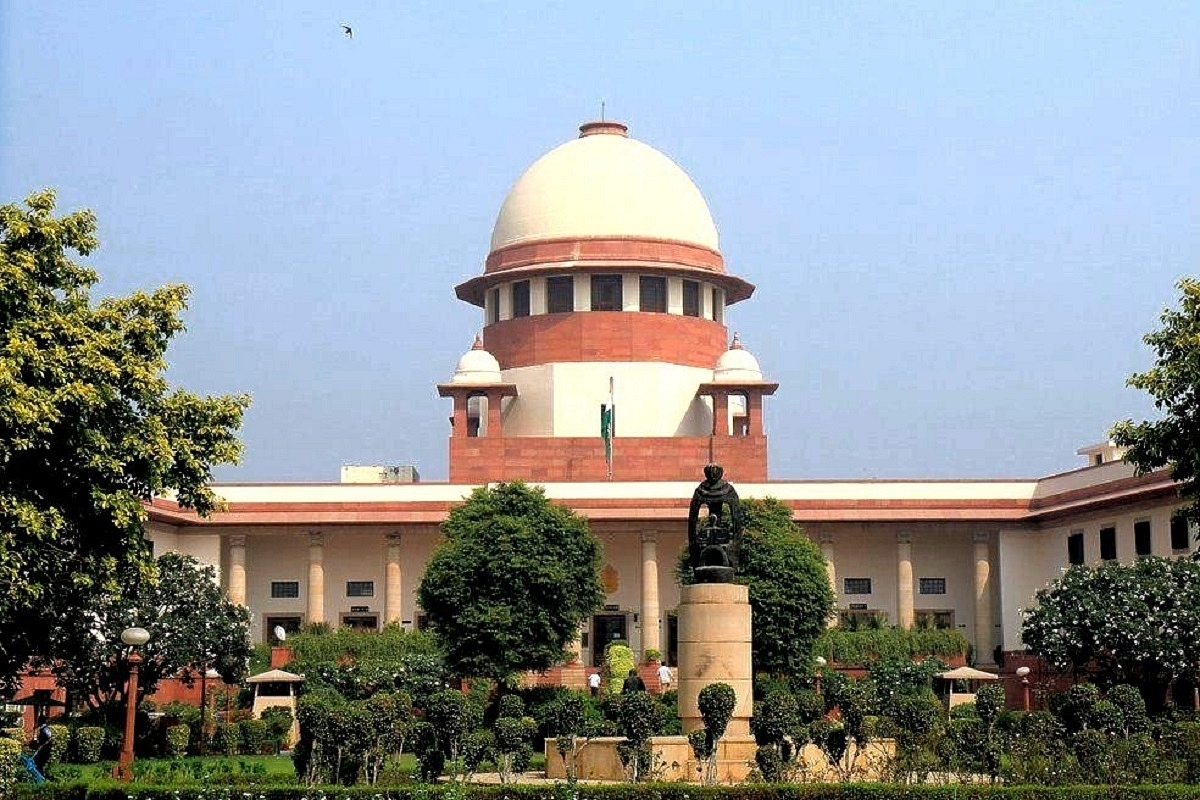News Brief
Power To Punish For Contempt Is A Constitutional Power, Cannot Be Taken Away Even By Legislative Enactment: Supreme Court
- While holding Rajiv Dahiya guilty of contempt of court, the Supreme Court asserted that its power to punish for contempt is a constitutional right which cannot be taken away even by legislative enactment.

Supreme Court of India. (@OnuorahMichael5/Twitter)
The Supreme Court, on Wednesday (29 September), held Suraz India Trust chairman Rajiv Dahiya guilty of contempt of court for defaming the court and wasting judicial time by repeatedly filing petitions accusing judges and court personnel, thus “scandalising and browbeating” the court.
Noting that Dahiya has not deposited the due fine, ie, Rs 25 lakh, which was earlier imposed on him for filing frivolous PILs, the court directed the Land Revenue Department to recover the said amount from his property as arrears.
The Supreme Court, referring to Article 129 and 142 of the Constitution, observed that its power to punish for contempt is a constitutional power which cannot be abridged or taken away even by legislative enactment.
“We refuse to back off”
A division bench comprising Justice Sanjay Kishan Kaul and Justice M M Sundresh observed that the contemnor, a “perennial litigant”, has been “throwing mud at all and sundry”, expecting the court to “back off”.
“We refuse to back off”, and are determined to take this matter to its “logical conclusion”, the bench sternly said.
The court also noticed the judgement in Re: Vijay Kurle & Ors and observed that there is no free pass for appearing in person to indulge in slanders with an intent to scandalise the court. “Motivated and calculated attempts to bring down the image of the judiciary in the estimation of the public and impair the administration of justice must bester themselves to uphold their dignity and the majesty of law...," said the top court.
"We are of the view that the contemnor is clearly guilty of contempt of court and his action to scandalise the court cannot be countenanced," the top court said.
“No remorse on part of the contemnor”
“In the current context if seen, the grievance arises on account of the inability of the contemnor to file public interest petitions on account of costs being imposed, which he claims to be unable to pay and the consequences thereof of not being able to prosecute his petitions, which are large in numbers. The contemnor has apparently made a profession of filing public interest petitions of subjects of which he may not know much and then seeking to scandalise the Court,” the bench noted.
The court observed that the "apologies submitted by him are only endeavours to get out of consequences, again followed by another set of allegations, thus a charade. There's been no remorse on part of the contemnor.”
The bench said that since a composite notice was issued to him on the conviction and sentence, there is no need to hear him separately on the sentence. However, the bench said it was giving him one more chance, and posted the matter for hearing on sentence on 7 October, reports Live Law.
Senior Advocate Manish Singhvi, appearing for the Rajasthan government, informed the court that the state government is considering taking disciplinary action against Dahiya (as he is a government employee).
A brief case history
On 1 May 2017, the Supreme Court's three-judge bench headed by the then Chief Justice of India, J S Khehar had imposed an exemplary cost of Rs 25 lakh on the NGO, Suraz India Trust, for filing frivolous petitions (64 cases across various courts), and wasting judicial time, and restrained the trust and its chairman, Rajiv Dahiya, from filing any case, including PIL, in any court.
In February 2021, a bench of justices S K Kaul and Hrishikesh Roy had issued bailable warrants against Dahiya for not depositing the imposed fine.
Directing Dahiya to deposit the amount within a month's time, the bench took note of all the 64 cases filed by Suraz India Trust in which Dahiya had levelled accusations against Judges in the name of public cause, without any success and for “repeatedly misusing” the jurisdiction of the top court.
“...This Court has held that an apology cannot be a defence, a justification can be accepted if it can be ignored without compromising the dignity of the Court," the apex court noted.
Support Swarajya's 50 Ground Reports Project & Sponsor A Story
Every general election Swarajya does a 50 ground reports project.
Aimed only at serious readers and those who appreciate the nuances of political undercurrents, the project provides a sense of India's electoral landscape. As you know, these reports are produced after considerable investment of travel, time and effort on the ground.
This time too we've kicked off the project in style and have covered over 30 constituencies already. If you're someone who appreciates such work and have enjoyed our coverage please consider sponsoring a ground report for just Rs 2999 to Rs 19,999 - it goes a long way in helping us produce more quality reportage.
You can also back this project by becoming a subscriber for as little as Rs 999 - so do click on this links and choose a plan that suits you and back us.
Click below to contribute.
Latest